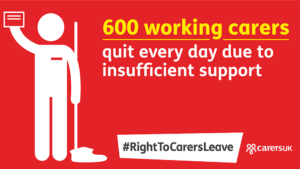Creating a carer-friendly workplace
Nearly half of carers are struggling to cope with balancing work and caring and need employers’ support to help them stay at work. In July 2020 the CIPD Voice (The professional body for HR and people development) surveyed working carers and found:
- 44% struggle to cope with balancing work and caring.
- 1 in 4 carers considered giving up their job entirely.
- 30% of carers have reduced their hours
- 36% of carers refused job offers, promotions
- 28% had not talked to anyone at work about caring.

Five steps for employers
Carers Oxfordshire supports employers to recognise and support carers. We recommend these five key steps to start putting in place proper, sustained support for working carers:
1. Understand what it means to be a carer
A carer provides unpaid support to a family member, partner or friend who relies on them for help because of a disability, illness, mental health problem or addiction that means they cannot stay safe and well. The support that carers provide can involve anything from taking them to appointments to assisting with mobility, continence, and administering medication.
2. Identify carers
One of the main obstacles to carers getting support is identification. Recognising you are a carer can be problematic and it is estimated that it takes around three years before a person sees themselves as a carer.
- Help Carers overcome the obstacles of self-identification.
- Promote Carers Oxfordshire and other support services in your organisation’s internal communications.
- Promote carer events such as carers week and carer’s rights day to your staff.
3. Embed a culture of openness and support for carers
Having a supportive, carer-friendly environment is key to enabling carers to feel that they can speak to someone about their caring role.
- Introduce a Carers Champion in the workplace.
- Provide training for managers to empower and support carers
- Consider options you may be able to introduce for carers such as a carers support network, drop-in lunchtime carer support sessions or a support plan for if carers need to deal with emergencies.
4. Develop and communicate a carer policy, framework, or guidance.
This will help develop effective formal measures and create an organisational culture that’s generally supportive of working carers.
5. Provide carers’ leave (paid or unpaid) and be adaptable when carers need to leave at short notice
The government recognised the importance of unpaid carers in its March 2020 consultation on carers’ leave. There was clear support across a range of respondents to introduce a new leave right for unpaid carers. Therefore, the Government will introduce the right for unpaid carers to take up to one week (5 working days) of unpaid leave per year.
Carer’s Leave Bill
On 21st October 2022 the Carer’s Leave Bill passed through its first crucial step, securing vital Government support. It calls for the right for unpaid carers to take up to one week (5 working days) of unpaid leave per year.
The new right would apply to unpaid carers in employment if the person they care for is closely associated with them. For example, family or a member of the same household. The person receiving the care must have a long-term care need or fall within a specified exception, such as a person with a terminal illness.
The right will apply from day one of their employment. Carers will be able to take the leave flexibly, from individual days or half-days up to the full five days in one go.
The unpaid leave can be used for providing care or planning for the provision of care. Examples include helping with cleaning, paying bills, medical care or moving someone into a care home.
Employers will benefit from greater productivity, increased staff retention, reduced recruitment costs and reduced sick leave. Carers will benefit from a more inclusive working environment, more support and value at work, and improved motivation, and productivity. Being able to take time out of work to care will reduce stress and improve their well-being.
Further reading
The new Carers Leave Bill
www.carersoxfordshire.org.uk/working-rights
Report: The Role of Carer Champions in the Workplace
Supporting Carers at Work: Carers Rights Day report – Carers UK
Carers’ leave consultation: government response
CIPD guide to becoming a carer-friendly workplace
